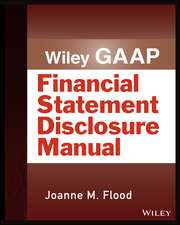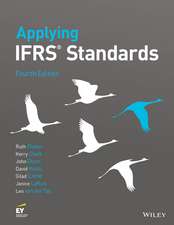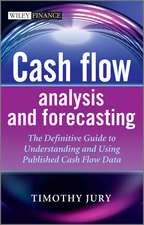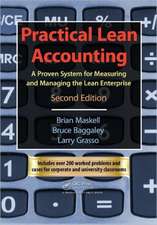Advances in Accounting Behavioral Research: Advances in Accounting Behavioral Research
Autor James E. Huntonen Limba Engleză Hardback – 14 iun 2001
Advances in Accounting Behavioral Research promotes research across all areas of accounting, incorporating theory from, and contributing knowledge to, the fields of applied psychology, sociology, management science, ethics and economics.
| Toate formatele și edițiile | Preț | Express |
|---|---|---|
| Hardback (4) | 889.77 lei 6-8 săpt. | |
| Emerald Publishing – 6 aug 1998 | 889.77 lei 6-8 săpt. | |
| Emerald Publishing – 19 dec 2000 | 892.41 lei 6-8 săpt. | |
| Emerald Publishing – 22 sep 1999 | 893.58 lei 6-8 săpt. | |
| Emerald Publishing – 14 iun 2001 | 952.04 lei 6-8 săpt. |
Preț: 952.04 lei
Preț vechi: 1236.41 lei
-23% Nou
Puncte Express: 1428
Preț estimativ în valută:
182.18€ • 190.68$ • 151.63£
182.18€ • 190.68$ • 151.63£
Carte tipărită la comandă
Livrare economică 31 martie-14 aprilie
Preluare comenzi: 021 569.72.76
Specificații
ISBN-13: 9780762307845
ISBN-10: 0762307846
Pagini: 424
Dimensiuni: 155 x 234 x 584 mm
Greutate: 0.77 kg
Editura: Emerald Publishing
Seria Advances in Accounting Behavioral Research
ISBN-10: 0762307846
Pagini: 424
Dimensiuni: 155 x 234 x 584 mm
Greutate: 0.77 kg
Editura: Emerald Publishing
Seria Advances in Accounting Behavioral Research
Cuprins
Part 1: Perspectives on Behavioral Research in Accounting. Where have all the leaders gone? (S. Sutton). Part II: Accounting Behavioral Research. A new culture? Evidence of support for diversity in public accounting performance evaluation judgments (E.N. Johnson et al.). Auditor work and its outcomes: an application of the job characteristics model to large public accounting firms (T.J. Fogarty, B. Uliss). Evaluating audit risk: the effects of tolerence-for-ambiguity, industry characteristics, and experience (B.A. Makkawi, R.W. Rutledge). The effect of role stress on budgetary participation and job satisfaction-performance linkages: a test of two different models (V.K. Chong, D. Bateman). The early identification of managerial motivation: an empirical examination (S.M. Bryant et al.). The influence of attributions and budget emphasis and risk preferences under conditions of unfavorable budget variances (D. Ryan, K. Wentzel). Accuracy and calibration in professional judgment: a study of tax practitioners (D. Samelson, C. Jeffrey). Relational demography and career outcomes among male and female academic accountants (C. Kirchmeyer et al.). Part III: Accounting Behavioral Theory. Creating an ethically driven organization: a model for fostering an epidemic of ethical intensity (V. Arnold et al.). Belief functions in accounting behavioral research (R.P. Srivastava, T.J. Mock). Theoretical reflections on the use of students as surrogate subjects in behavioral experimentation (M. Walters-York, A.P. Curatola). E-research: moving behavioral accounting research into cyberspace (T.L. Herron, G.R. Young, II).
















